Serbian rock is the rock music scene of Serbia. During the 1960s, 1970s and the 1980s, while Serbia was a constituent republic of Socialist Federal Republic of Yugoslavia, Serbian rock scene was a part of the SFR Yugoslav rock scene.

Prljavo kazalište is a rock band from Zagreb, Croatia. Since its formation in 1977, the group changed several music styles and line ups but remained one of the top acts of both the Croatian and Yugoslav rock scenes.
New wave in Yugoslavia was the new wave music scene of the Socialist Federal Republic of Yugoslavia. As its counterparts, the British and the American new wave, from which the main influences came, the Yugoslav scene was also closely related to punk rock, ska, reggae, 2 tone, power pop and mod revival. Some of its acts are also counted as belonging to the Yugoslav punk scene which already existed prior to new wave. Such artists were labeled as both punk rock and new wave.

Pankrti are a punk rock band from Ljubljana, Slovenia, active in the late 1970s and 1980s. They were known for provocative and political songs. They billed themselves as The First Punk Band Behind The Iron Curtain. They are one of the most important former Yugoslav punk groups and one of the first punk rock bands ever formed in a communist country.

Paket aranžman is a new wave compilation album released in 1981 by Jugoton. Featuring eminent Belgrade acts Šarlo Akrobata, Idoli and Električni Orgazam, it is considered to be one of the most important and influential records ever made in SFR Yugoslavia. In addition to critical praise, it reached a cult status among the audiences and continues to be popular across the countries that emerged after the breakup of Yugoslavia.

Paraf was a punk rock and later post-punk band from Rijeka, Croatia, known as one of the pioneers of punk rock in the SFR Yugoslavia.
Punk rock in Yugoslavia was the punk subculture of the former Socialist Federal Republic of Yugoslavia. The most developed scenes across the federation existed in the Socialist Republic of Slovenia, the Adriatic coast of the Socialist Republic of Croatia, the Socialist Autonomous Province of Vojvodina and Belgrade, the capital of both Yugoslavia and the Socialist Republic of Serbia. Some notable acts included: Pankrti, Paraf, Pekinška patka, KUD Idijoti, Niet, Patareni and KBO!.

Novi Punk Val is a compilation album of punk rock and new wave music from the SFR Yugoslavia. It covers the period from 1978 till 1980. It was released by ZKP RTLJ in 1981. It includes songs by notable Slovenian and Croatian artists from the former Yugoslav punk rock and new wave scenes including: Pankrti, Paraf, Prljavo kazalište, Termiti and others.

Artistička radna akcija is a new wave and punk rock compilation album released in 1981 by Jugoton in SFR Yugoslavia. It presents a snapshot of the early 1980s Belgrade underground music scene through bands Radnička Kontrola, Bezobrazno Zeleno, Profili Profili, Defektno Efektni, Urbana Gerila, Petar i Zli Vuci, U Škripcu, Pasta ZZ, VIA Talas and TV Moroni, all of whom took part in the compilation as means of showcasing their material to a wider audience.
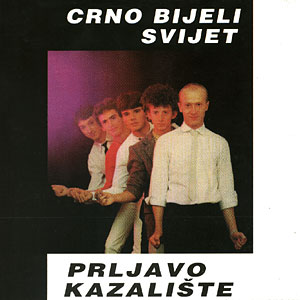
Crno-bijeli svijet is the second album by the Croatian and former Yugoslav rock band Prljavo Kazalište from their new wave period.
Popular music in Yugoslavia includes the pop and rock music of the former SFR Yugoslavia, including all their genres and subgenres. The scene included the constituent republics: SR Slovenia, SR Croatia, SR Bosnia and Herzegovina, SR Montenegro, SR Macedonia and SR Serbia and its subunits: SAP Vojvodina and SAP Kosovo. The pop and rock scene was a part of the general Music of Yugoslavia, which also included folk, classical music, jazz etc. Within Yugoslavia and internationally, the phrases ex-YU or ex-Yugoslav Pop and Rock both formally and informally generally to the SFRY period, though in some cases also to its successor the FR Yugoslavia including Serbia and Montenegro which existed until 2006.
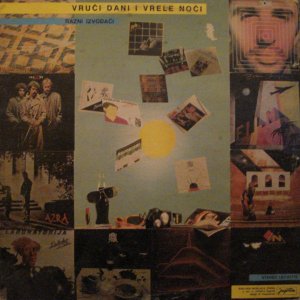
Vrući dani i vrele noći is a compilation album released by Jugoton in 1982 in the former SFR Yugoslavia.

Svi marš na ples! is a compilation album released by Jugoton in 1981 in SFR Yugoslavia.
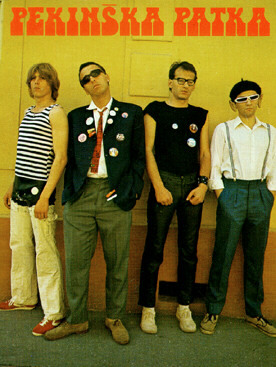
Pekinška Patka is an eminent Serbian and former Yugoslav punk rock band from Novi Sad. Their debut album, Plitka poezija, released in 1980, is considered the first punk rock album by a band coming from Serbia. Being one of the first punk acts in Yugoslavia, they played a major role in opening doors for many bands that came after.
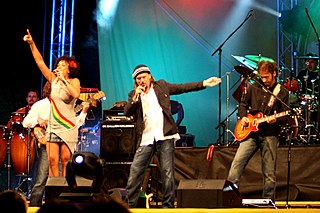
Croatian popular music is the popular music of Croatia.
Mirko Ilić is a Bosnian-born comics artist and graphic designer based in New York City.
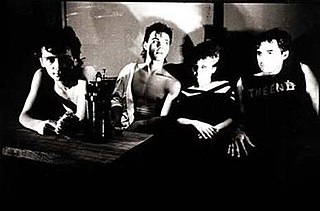
Luna was a Serbian and former Yugoslav post-punk/gothic rock band from Novi Sad.
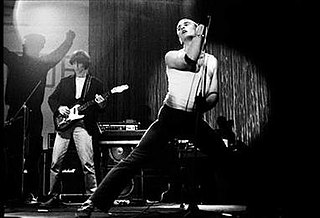
Petar i Zli Vuci were a former Yugoslav new wave/ska band from Belgrade, notable as the participant of the Artistička radna akcija project.
Zvoncekova Bilježnica is a Serbian punk rock/hardcore punk band from Aranđelovac.

Boye were a Serbian and Yugoslav rock band formed in Novi Sad in 1981. Until the late 1980s, Boye were an all-female band, but later lineups also featured male members, with drummer Biljana Babić being the only mainstay member during the band's career. Initially a part of the Yugoslav new wave scene, Boye later moved towards garage rock-influenced alternative rock. The band released four studio albums before disbanding in 2000.













